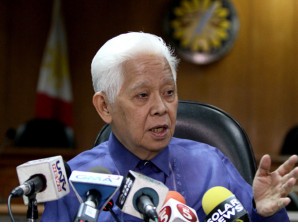
Comelec Chairman Sixto Brillantes. INQUIRER FILE PHOTO
MANILA, Philippines—Commission on Elections Chairman Sixto Brillantes warned the National Citizens’ Movement for Free Elections Friday against openly criticizing the Comelec, reminding the private election watchdog body he had the authority to cancel its accreditation as one of the commission’s citizen arms.
“Just a little warning. Not because we gave accreditation you can do anything as you please,” Brillantes said in an interview. “We also have the same authority to cancel accreditation if we think you cannot function as a citizens arm. If you would rather act as a critic or a detractor of the Comelec, maybe you should get out as a citizens’ arm.”
Brillantes made the remark in response to Namfrel’s statement that it had concerns regarding the reliability of the precinct count optical scan (PCOS) machines that will be used in the May 13 elections.
But despite the tone and the words he used, Brillantes said he was not making any threat.
“I’m not threatening them that we will take back their accreditation. I’m just saying… we don’t want to be unreasonable, but they should also not be unreasonable to us,” he said. “Delicadeza dictates that if they want to criticize us, they should not act as a citizens’ arm.”
Brillantes said he was surprised that a letter from Namfrel head Corazon dela Paz-Bernardo to the Comelec was released to the media.
Brillantes said that when he talked to Bernardo, he thought Namfrel would raise its concerns to him and the Comelec in private and not through a press statement.
“The statement that the PCOS is unreliable is a very serious one… Coming from a citizens arm that we have accredited, I think it’s definitely unacceptable to us,” he added. “And besides, they were talking about the mock elections which happened several months ago. Why are they coming out now when the elections are drawing very close?”
In her letter, Bernardo said Namfrel was concerned about the capability of the PCOS machines to initialize, operate and transmit the results on election day.
She said Namfrel’s “apprehension” was based on the problems during the February mock elections, various failed PCOS demonstrations, and the problems encountered during the first few days of overseas absentee voting.
But Brillantes insisted that the PCOS machines, which scan ballots and add up votes cast in a polling precinct as well as transmit the results to canvassing and tabulation centers, were reliable and should not be a cause for concern.
“The mock elections were really for our own assessment of the actual conditions during the mock elections to ensure that we will be able to detect the system’s flaws. There were some flaws but these concerns have already been addressed,” he said.